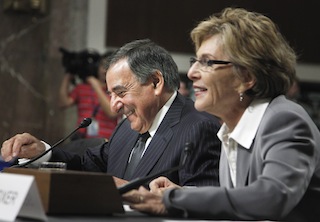The Defense Department is abandoning its plan to close several domestic military bases across the country, claiming to focus instead on closing military installations overseas, according to Secretary Leon Panetta.
 “I had no illusions that [base closures] would be an easy sell politically, but we had a responsibility … to put everything on the table,” Panetta said in a speech at the annual conference of the Association of Defense Communities in Monterey, Calif. “It is now clear that there will not be a round of [closures] authorized in 2013.”
“I had no illusions that [base closures] would be an easy sell politically, but we had a responsibility … to put everything on the table,” Panetta said in a speech at the annual conference of the Association of Defense Communities in Monterey, Calif. “It is now clear that there will not be a round of [closures] authorized in 2013.”
The considerations were labeled in the media as some sort of draconian scaling back of the enormous standing army in the country. But the scope of the domestic military establishment is enormous.Only two of the 50 states – Rhode Island and New Hampshire – have no Army bases.
In fact, the military is dealing with excess capacity already. If Congress doesn’t authorize closing the bases, the Army “will be forced to retain installation infrastructure that will become excess to its requirements and thereby jeopardize spending on forces, training and modernization,” said Pentagon spokesman Dave Foster in April.
Panetta’s claim to be scaling back America’s enormous military presence all over the world (the most commonly accepted figure is upwards of 900 military bases in over 130 countries) doesn’t seem to be matching up with reality.
The Pentagon is currently carrying out a plan to surge American military presence in the Persian Gulf to intimidate a weak and defensive Iran. At the same time, they are building new bases and refurbishing old ones throughout the Pacific region.


